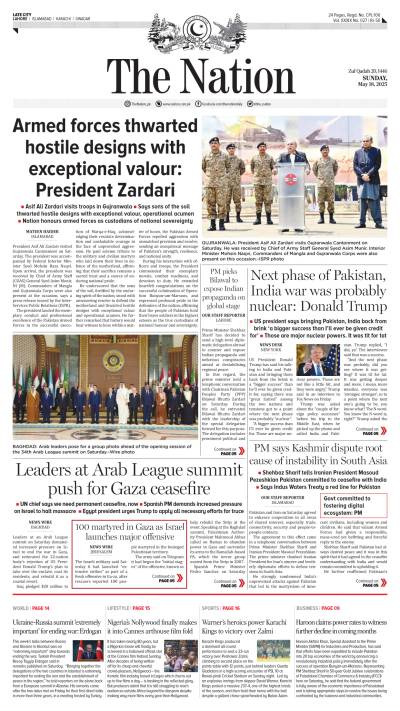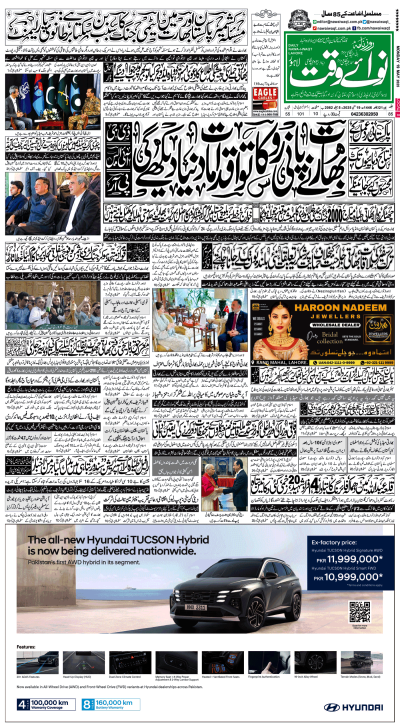islamabad - The users of private and public transport are already feeling jittery at severe traffic jams on Islamabad Highway in wake of construction work on major portion of the signal free corridor.
Hence, they have started pleading for complete ban on heavy traffic, particularly trucks, on the highway during peak hours.
As the authorities are ready to kick off work on Koral interchange, to
be followed, sooner than later, by the widening of the road from Koral to
Rawat, the motorists can foresee the chaos and bedlam on the road when the work is in full swing.
The two dilapidated lanes on each side of the highway from Koral Chowk to T-Chowk are packed with traffic due to presence of large number of private housing societies alongside the road and ban on the entry of heavy traffic into Rawalpindi. It is being feared that during the construction of three inter-changes one each at Koral, Japan Road and T-Chowk, together with an underpass at Gulberg-Judicial intersection, the problems of motorists will further inculcate and some immediate steps are needed to be taken in this regard.
“Capital Development Authority (CDA) has already started trimming of grass and cleaning of surrounding parts of Koral Chowk, while laboratory testing and installation of concrete plants has also been initiated,” said Project Director Shahid Mehmood, adding the interchange would cost Rs 1.70 billion and would be completed within a period of eight months.
“Once the machinery will arrive and formal work is started at the junction, flow of traffic will definitely disturb adding to the woes of the motorists,” said Mumtaz Alvi, a businessman by profession and living at Judicial Colony. He said long queues of vehicles could already be witnessed at the very point particularly during peak hours and the authorities concerned must foresee the complexity of the situation.
The 12.5 kilometres portion of the highway from Koral Chowk to GT Road is perhaps the busiest part as far as movement of vehicles, both light and heavy, is concerned. But the wear and tear of the road speaks off the negligence on the part of authorities concerned for so long, before the incumbent government decided to rehabilitate it on modern grounds.
SSP Traffic Malik Matloob said two inspectors for Lohi Bher and Sihala had already been designated to regulate traffic in the section. He was of the view that the road was only two-lane and in dilapidated condition while movement of heavy traffic was also a tough task.
Being established with a cost of Rs 21.814 billion, the Islamabad Signal-free Corridor, once established, would benefit hundreds of thousands of motorists by reducing the travel time over the 25-km road by at least 20 minutes, besides giving a comfortable journey to them.
“When the road was last reconstructed and changed into a concrete pathway back in 2007, there used to be severe traffic mess as it usually took almost an hour to reach to Koral chowk from PWD housing society,” said Zahoor Ahmed, a resident of Media Town.
The situation this time would get worsen this time around as during past eight years the population had increased considerably in the private housing societies, he said, adding every second day a truck breaks down in the middle of the road and cause traffic jam.
The SSP traffic admitted the fact that technical faults develop in most of the loaded trucks due to poor condition of the road and it takes seven to eight hours to remove the faulty vehicles.
Zulfiqar Shah, a bank officer and a resident of Soan Gardens suggested that the entry of heavy traffic on Islamabad Highway from GT Road should be banned at least during peak hours in order to avoid traffic mess.
Meanwhile, when contacted Public Relation Officer (PRO) Islamabad Traffic Police (ITP) Sajjad Haider said currently there was no such plan of banning the entry of heavy traffic into the capital, however, an alternative plan would be given once expansion of the road was started.
Monday, May 19, 2025
Motorists want ban on heavy traffic
Signal-free corridor construction

-
Lahore emerges among safest global cities in Numbeo 2025 index
-
Lahore emerges among safest global cities in Numbeo 2025 index
-
India’s suspension of Indus Water Treaty legally baseless
-
Seventh polio case reported in Pakistan amid nationwide vaccination drive
-
Pakistan reports sixth polio case of 2025
-
PTA begins issuing VPN licences to regulate usage
Regional Reset
May 19, 2025
Peak Potential
May 19, 2025
United Front
May 19, 2025
Culture Shift
May 18, 2025
Tactical Shift
May 18, 2025
Pakistan’s Strategic Edge
May 19, 2025
Lessons for India
May 19, 2025
Galiyat’s Poor Network Services
May 19, 2025
A City in Neglect
May 19, 2025
Rising Cost of Living
May 19, 2025
ePaper - Nawaiwaqt
Nawaiwaqt Group | Copyright © 2025





